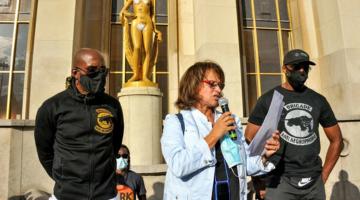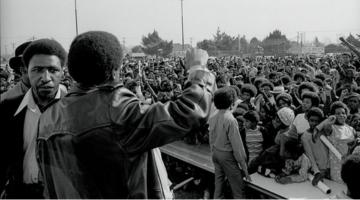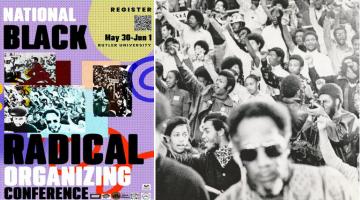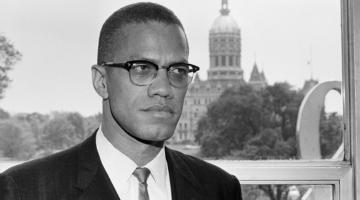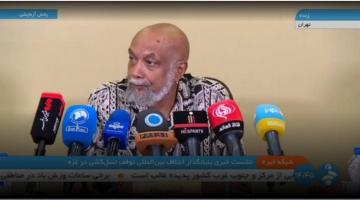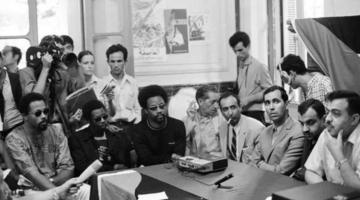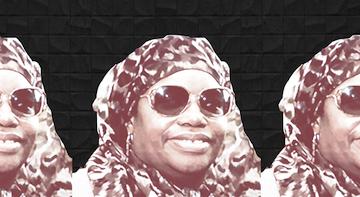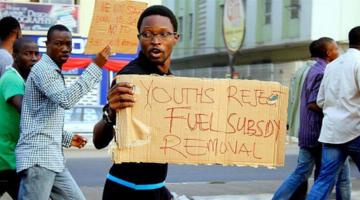Black August is the commemoration of actions carried out by revolutionaries ranging from Nat Turner to George Jackson. It is a month to "study, fast, train, and fight" to build the Black radical tradition.
This article was originally published in The Brooks Blackboard: Race, Politics, and Social Change.
The 31 days of August hold a particular and special meaning you will not find in the celebrations that come with Juneteenth, Black History Month or Kwanzaa. For 43 years now since 1979, Black August commemorates and highlights political prisoners and their crucial role in the Black liberation/freedom struggle. Black August is directly tied to the Black prison movement that started in the San Quentin prison and through relentless organizing spread to other prisons as well as to the streets.
The story of Black August[1] begins immediately behind the prison walls after Jonathan and George Jackson were killed in August 1970, and 1971 respectively, as well as W.L. Nolan (killed January 1970), James McClain, William Christmas (killed with George) and Khatari Gaulden (killed August 1st, 1978). Back in August 1979, Arm the Spirit dedicated the first issue establishing Black August, “To commemorate the lives of George and Jonathan Jackson, Black prisoners at San Quentin have set aside the month of August as a month of Black cultural and revolutionary development. Through educational and other activities efforts will be directed toward transforming the Black "criminal mentality" into revolutionary mentality to making the popular prison masses conscious of their social, political, economic, and racial oppression, and to elevating the already existing revolutionary consciousness.”
From the beginning, Black August was intended to be cathartic, reflective and rooted in disciplined behavior. Early followers of Black August began to coalesce around guiding principles such as unity, self-sacrifice, political education, physical training and resistance. From here, participants wore black armbands on their left arm, establish political education/study groups, refrain from using drugs, and alcohol while engaging in daily exercise, “It's a time to dedicate and rededicate ourselves to our freedom struggle and build and prepare ourselves physically, mentally and spiritually for the struggle ahead. August is most definitely a month of great historical and spiritual significance to our people and fasting during this month should keep this foremost in our minds,”[2] wrote the Editorial Collective (August 1979 Arm the Spirit issue).
During the early years as August 21st coalitions and committees were in formation and organizing Black folk in and outside of the prisons around Black August, these Black activists, radicals and revolutionaries were subjected to and targeted with relentless and harsh attacks via police harassment, brutality, surveillance, and arrest. Once arrested, and incarcerated, they were again targeted with vicious torture, hostility and mistreatment; deprived of sleep, medical care, and imprisoned in segregated housing units for 23 hours a day. But they maintained and advanced their political struggle behind the walls making demands for their human rights. Supporters on the outside formed committees and filed lawsuits while the prisoners on the inside organized, went on strikes and rebelled. We saw this in Attica in 1972.
This is the foundation and legacy Black August set and 43 years later, the radical and revolutionary spirit of Black August continues to resonate more widely today. That is a result of the work of organizations such as the Black August Organizing Committee, Malcolm X Grassroots Movement, New Afrikan Independence Movement, and the Jericho Movement, who are amongst those organizations and formations around the country committed to securing the freedom for all political prisoners. Along with month-long activities holding up political prisoners, Black August has evolved through the years to include historical markers in radical Black history also occurring in August that includes the arrival of the first African slaves in 1619, the Haitian Revolution in 1791, Nat Turner's 1831 rebellion, birth of Marcus Garvey and establishing the Universal Negro Improvement Association (UNIA), and Watts uprising are just a few examples.
Today, the issue of political prisoners brings into focus not only the devastating impact of COINTELPRO but the relationship between the prison industrial complex to Black people via racism, capitalism and imperialism on one hand and targeted surveillance, harassment, arrest and imprisonment, on the other. Today’s political prisoners serve the longest sentences and have to endure the harshest of prison conditions eventually leading to serious debilitating health issues that include tuberculosis, deteriorating skin disease, cancers, cirrhosis and now COVID.[3]
Ruchell Magee is 84 years old and is currently the longest held political prisoner serving 59 years in prison – and was recently denied parole, again. Mumia Abu-Jamal is 68 years old, incarcerated since 1981, Mutulu Shakur is 72 years old and incarcerated since 1986, Imam Jamil Al-Amin, formerly H. Rap Brown is 78 years old and incarcerated since 2000. But the list doesn’t stop here, there’s more.
The recent health concerns aggravated with contracting COVID, have prompted campaigns demanding their immediate release. The outright denial of the release for these aging prisoners in declining health during this horrific COVID period, not only deepens our clarity of the state’s sustained attack on political prisoners, and draws a picture of the fight ahead, but also deepens the resolve to secure their release from prison. We’re reminded of what, former political prisoner Dhoruba Bin Wahad wrote his seminal essay, In Speaking Truth to Power: Political Prisoners in the United States, where he wrote in part: “The existence of political prisoners in the United States goes to the very heart of the racist nature of this society. To not deal with the issue of political prisoners in the U.S. is to not deal with the true 'nature of America.' ”
[1] https://www.leftvoice.org/george-jackson-black-august-revolutionary/
[2]http://freedomarchives.org/Documents/Finder/DOC513_scans/Black_August_Resistance/513.Black.August.Resistance.Ashanti.Ali.Letter.pdf
[3] https://www.blackstarnews.com/us-politics/justice/secret-pandemic-why-all-elderly-black-political-prisoners-deserve
Charles Brooks hosts the blog Brooks Blackboard: Race, Politics and Social Change.


